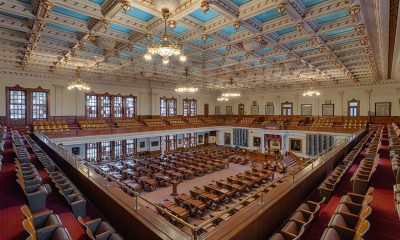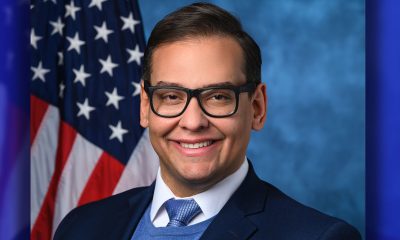Politics
Senate Creating Secret Encyclopedia of US Spy Programs

In this Dec. 9, 2014 file photo, Senate Intelligence Committee Vice Chair Sen. Dianne Feinstein, D-Calif. speaks to reporters on Capitol Hill in Washington. Trying to get a handle on hundreds of sensitive, closely held surveillance programs, the Senate intelligence committee is compiling a secret encyclopedia of American eavesdropping programs in an effort to improve congressional oversight of Americas sprawling global spying effort. (AP Photo/J. Scott Applewhite, File)
KEN DILANIAN, AP Intelligence Writer
WASHINGTON (AP) — Trying to get a handle on hundreds of sensitive, closely held surveillance programs, a Senate committee is compiling a secret encyclopedia of American intelligence collection. It’s part of an effort to improve congressional oversight of the government’s sprawling global spying effort.
Sen. Dianne Feinstein launched the review in October 2013, after a leak by former National Security Agency systems administrator Edward Snowden disclosed that the NSA had been eavesdropping on German Chancellor Angela Merkel’s cellphone. Four months earlier, Snowden had revealed the existence of other programs that vacuumed up Americans’ and foreigners’ phone call records and electronic communications.
“We’re trying right now to look at every intelligence program,” Feinstein told The Associated Press. “There are hundreds of programs we have found … sprinkled all over. Many people in the departments don’t even know (they) are going on.”
Feinstein and other lawmakers say they were fully briefed about the most controversial programs leaked by Snowden, the NSA’s collection of American phone records and the agency’s access to U.S. tech company accounts in targeting foreigners through its PRISM program. Those programs are conducted under acts of Congress, supervised by a secret federal court.
But when it comes to surveillance under Executive Order 12333, which authorizes foreign intelligence collection overseas without a court order, there are so many programs that even the executive branch has trouble keeping track of them, Feinstein said. Many are so sensitive that only a handful of people are authorized to know the details, which complicates the management challenge.
Lawmakers who serve on the intelligence committee sometimes have difficulty making sense of the information they receive, some of which can’t be shared even with some of their own staff.
Director of National Intelligence James Clapper has joked that only one entity in the universe has complete visibility over all the U.S. government’s secret intelligence programs — “That’s God.”
Feinstein, a California Democrat, initially wasn’t sure that Sen. Richard Burr of North Carolina, who took her place as chairman of the panel when Republicans took control of the Senate in January, would agree to continue the review. But Burr and Feinstein recently reached an agreement to do so, said Senate aides. They were not authorized to discuss the inner committee workings publicly and spoke only on condition of anonymity.
Two executive branch officials who had been detailed to the committee are returning to the executive branch and will not be replaced, the aides said, so the effort will be entirely the work of congressional staff. The project will end in September, the aides said.
Burr declined to comment. His spokeswoman, Rebecca Glover Watkins, said in an email that the committee “is constantly and continuously engaged in oversight of intelligence community activities. It is the very core of what the committee does, day in and day out, and it is a key component of the work done by the committee’s professional staff.”
Feinstein initiated the review, she said, after she and other lawmakers were taken by surprise by the revelation that the NSA was spying on the leader of a close ally.
At the time, Feinstein said the intelligence committee, which is regularly briefed on spying programs, had not been “satisfactorily informed,” about some NSA surveillance. “Therefore our oversight needs to be strengthened and increased.”
After that disclosure, President Barack Obama ordered his own review of NSA surveillance that resulted in the termination of some eavesdropping on the leaders of certain unidentified friendly countries.
The review will allow lawmakers to maintain and access information on all the programs, but will avoid creating a single document that amounts to a roadmap to American surveillance, said U.S. officials. They were not authorized to be quoted because some details are classified. Although the Senate intelligence committee has vaults, safes and secure computer networks, officials do not want to risk leaving such a file in the custody of the Senate.
If senators object to any of the surveillance, they can raise the issue in secret with Obama administration officials. They can’t force a change, but they can use their influence over legislation, budgets and nominations to press for it.
However, that influence has its limits, as Sens. Ron Wyden and Mark Udall discovered when they sought to warn about some of the NSA collection that Snowden ultimately leaked. They could not make their warnings clear enough without disclosing secrets.
___
Follow Ken Dilanian on Twitter at https://twitter.com/KenDilanianAP
Copyright 2015 The Associated Press. All rights reserved. This material may not be published, broadcast, rewritten or redistributed.
Activism
OP-ED: AB 1349 Puts Corporate Power Over Community
Since Ticketmaster and Live Nation merged in 2010, ticket prices have jumped more than 150 percent. Activities that once fit a family’s budget now take significant disposable income that most working families simply don’t have. The problem is compounded by a system that has tilted access toward the wealthy and white-collar workers. If you have a fancy credit card, you get “presale access,” and if you work in an office instead of a warehouse, you might be able to wait in an online queue to buy a ticket. Access now means privilege.

By Bishop Joseph Simmons, Senior Pastor, Greater St. Paul Baptist Church, Oakland
As a pastor, I believe in the power that a sense of community can have on improving people’s lives. Live events are one of the few places where people from different backgrounds and ages can share the same space and experience – where construction workers sit next to lawyers at a concert, and teenagers enjoy a basketball game with their grandparents. Yet, over the past decade, I’ve witnessed these experiences – the concerts, games, and cultural events where we gather – become increasingly unaffordable, and it is a shame.
These moments of connection matter as they form part of the fabric that holds communities together. But that fabric is fraying because of Ticketmaster/Live Nation’s unchecked control over access to live events. Unfortunately, AB 1349 would only further entrench their corporate power over our spaces.
Since Ticketmaster and Live Nation merged in 2010, ticket prices have jumped more than 150 percent. Activities that once fit a family’s budget now take significant disposable income that most working families simply don’t have. The problem is compounded by a system that has tilted access toward the wealthy and white-collar workers. If you have a fancy credit card, you get “presale access,” and if you work in an office instead of a warehouse, you might be able to wait in an online queue to buy a ticket. Access now means privilege.
Power over live events is concentrated in a single corporate entity, and this regime operates without transparency or accountability – much like a dictator. Ticketmaster controls 80 percent of first-sale tickets and nearly a third of resale tickets, but they still want more. More power, more control for Ticketmaster means higher prices and less access for consumers. It’s the agenda they are pushing nationally, with the help of former Trump political operatives, who are quietly trying to undo the antitrust lawsuit launched against Ticketmaster/Live Nation under President Biden’s DOJ.
That’s why I’m deeply concerned about AB 1349 in its current form. Rather than reining in Ticketmaster’s power, the bill risks strengthening it, aligning with Trump. AB 1349 gives Ticketmaster the ability to control a consumer’s ticket forever by granting Ticketmaster’s regime new powers in state law to prevent consumers from reselling or giving away their tickets. It also creates new pathways for Ticketmaster to discriminate and retaliate against consumers who choose to shop around for the best service and fees on resale platforms that aren’t yet controlled by Ticketmaster. These provisions are anti-consumer and anti-democratic.
California has an opportunity to stand with consumers, to demand transparency, and to restore genuine competition in this industry. But that requires legislation developed with input from the community and faith leaders, not proposals backed by the very company causing the harm.
Will our laws reflect fairness, inclusion, and accountability? Or will we let corporate interests tighten their grip on spaces that should belong to everyone? I, for one, support the former and encourage the California Legislature to reject AB 1349 outright or amend it to remove any provisions that expand Ticketmaster’s control. I also urge community members to contact their representatives and advocate for accessible, inclusive live events for all Californians. Let’s work together to ensure these gathering spaces remain open and welcoming to everyone, regardless of income or background.
Activism
Oakland Post: Week of December 31, 2025 – January 6, 2026
The printed Weekly Edition of the Oakland Post: Week of – December 31, 2025 – January 6, 2026

To enlarge your view of this issue, use the slider, magnifying glass icon or full page icon in the lower right corner of the browser window.
Activism
2025 in Review: Seven Questions for Assemblymember Lori Wilson — Advocate for Equity, the Environment, and More
Her rise has also included several historic firsts: she is the only Black woman ever appointed to lead the influential Assembly Transportation Committee, and the first freshman legislator elected Chair of the California Legislative Black Caucus. She has also been a vocal advocate for vulnerable communities, becoming the first California legislator to publicly discuss being the parent of a transgender child — an act of visibility that has helped advanced representation at a time when political tensions related to social issues and culture have intensified.

By Edward Henderson, California Black Media
Assemblymember Lori D. Wilson (D-Suisun City) joined the California Legislature in 2022 after making history as Solano County’s first Black female mayor, bringing with her a track record of fiscal discipline, community investment, and inclusive leadership.
She represents the state’s 11th Assembly District, which spans Solano County and portions of Contra Costa and Sacramento Counties.
Her rise has also included several historic firsts: she is the only Black woman ever appointed to lead the influential Assembly Transportation Committee, and the first freshman legislator elected Chair of the California Legislative Black Caucus. She has also been a vocal advocate for vulnerable communities, becoming the first California legislator to publicly discuss being the parent of a transgender child — an act of visibility that has helped advanced representation at a time when political tensions related to social issues and culture have intensified.
California Black Media spoke with Wilson about her successes and disappointments this year and her outlook for 2026.
What stands out as your most important achievement this year?
Getting SB 237 passed in the Assembly. I had the opportunity to co-lead a diverse workgroup of colleagues, spanning a wide range of ideological perspectives on environmental issues.
How did your leadership contribute to improving the lives of Black Californians this year?
The Black Caucus concentrated on the Road to Repair package and prioritized passing a crucial bill that remained incomplete during my time as chair, which establishes a process for identifying descendants of enslaved people for benefit eligibility.
What frustrated you the most this year?
The lack of progress made on getting Prop 4 funds allocated to socially disadvantaged farmers. This delay has real consequences. These farmers have been waiting for essential support that was promised. Watching the process stall, despite the clear need and clear intent of the voters, has been deeply frustrating and reinforces how much work remains to make our systems more responsive and equitable.
What inspired you the most this year?
The resilience of Californians persists despite the unprecedented attacks from the federal government. Watching people stay engaged, hopeful, and determined reminded me why this work matters and why we must continue to protect the rights of every community in our state.
What is one lesson you learned this year that will inform your decision-making next year?
As a legislator, I have the authority to demand answers to my questions — and accept nothing less. That clarity has strengthened my approach to oversight and accountability.
In one word, what is the biggest challenge Black Californians are facing currently?
Affordability and access to quality educational opportunities.
What is the goal you want to achieve most in 2026?
Advance my legislative agenda despite a complex budget environment. The needs across our communities are real, and even in a tight fiscal year, I’m committed to moving forward policies that strengthen safety, expand opportunity, and improve quality of life for the people I represent.
-

 Activism4 weeks ago
Activism4 weeks agoDesmond Gumbs — Visionary Founder, Mentor, and Builder of Opportunity
-

 Activism4 weeks ago
Activism4 weeks agoFamilies Across the U.S. Are Facing an ‘Affordability Crisis,’ Says United Way Bay Area
-

 Alameda County3 weeks ago
Alameda County3 weeks agoOakland Council Expands Citywide Security Cameras Despite Major Opposition
-

 Alameda County3 weeks ago
Alameda County3 weeks agoBling It On: Holiday Lights Brighten Dark Nights All Around the Bay
-

 Activism4 weeks ago
Activism4 weeks agoBlack Arts Movement Business District Named New Cultural District in California
-

 Activism4 weeks ago
Activism4 weeks agoLu Lu’s House is Not Just Toying Around with the Community
-

 Activism4 weeks ago
Activism4 weeks agoOakland Post: Week of December 17 – 23, 2025
-

 Activism2 weeks ago
Activism2 weeks agoFirst 5 Alameda County Distributes Over $8 Million in First Wave of Critical Relief Funds for Historically Underpaid Caregivers






















































